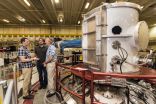(Press-News.org) Arguments about whose turn it is to do the washing up, negotiating rights to the TV remote control and disputes over noise — as many students returning to university for the new academic year are about to learn the hard way, sharing a house can be a tricky business.
And now research from academics at The University of Nottingham has revealed that new technology to allow people to monitor their energy usage in the home could be about to ratchet up the tension.
The study by a team of technology experts and psychologists found that meters which allowed residents to look at both communal and individuals' energy use could lead to feelings of shame and anger among those house sharing, potentially creating conflict.
Dr Caroline Leygue, from the University's Horizon Digital Economy Research, said: "Importantly, beyond simple effects on energy use, we were interested in how these displays influenced emotions and the interactions that people had around them. For example, if people saw that someone used more than their fair share of energy, depending on the display they felt more anger, or guilt and fear — not the intended consequence of installing an energy display!"
Next year will see the start of a Government initiative to roll out the installation of new Smart meters in all UK homes by 2020 in an effort to tackle the problem of soaring consumer energy bills.
The smart meters will allow people to see how much energy they are using and how much it is costing. The idea is to encourage consumers to use less gas and electricity.
However, to-date there has been little research into how the new smart meters might change behaviour, particularly in homes of multiple-occupancy - despite the fact that less than 30 per cent of homes in the UK are currently inhabited by only one person.
The Nottingham research, published in the journal Frontiers in Energy Research: Energy Systems and Policy, randomly placed volunteers into one of two theoretical scenarios — one in which they all split the energy bill but one or more people are using more than their fair share (free-riding) and another in which the energy is used equally in the household.
Both scenarios depicted a situation where the study participant shared a house with three other people that he or she did not know – a common situation in the UK.
In the equal split scenario, it was explained that each person paid £20 each towards the bill, while in the free-riding scenario the energy display showed that more energy was used by one or more people, yet the bill was still equally divided with each housemate paying £35.
Within the scenarios, they were shown one of three types of smart meter displays that, to a varying degree, could identify which housemates were using more than their fair share. They then had to answer a series of questions about the scenarios, their reactions to the situation and how much energy they were likely to use in the future.
The results showed that the more information people had on the display about their other housemates' usage, the more angry they became and wanted to punish those who used too much.
As a reaction to this, more than one-third of people (36.4 per cent) said they would call a house meeting to discuss the issue, while almost one-quarter (24.7 per cent) said they would make sure that the free-rider would pay more in proportion to the energy they had used. More than one-fifth of people (23 per cent) said they would confront the person using more electricity and ask them to reduce their electricity use.
No one said they would ostracise the free rider, just 1.8 per cent of the participants said they would gossip about the free-rider with other housemates and interestingly less than one per cent (0.8 per cent) would decide to do nothing.
In situations where only an average energy use display was used, people were more likely to feel fearful and guilty, which was also associated with an intention to reduce their own energy use. They were also more likely to use a more conciliatory approach when dealing with a situation in which an unidentified housemate had used more energy, such as asking all housemates to switch off appliances when not using them.
The research has important implications for the design of future domestic smart meters. It shows that average energy display smart meters, similar to those being rolled out across the country, are more effective in encouraging people to reduce their energy use.
However, in a situation where one housemate, who cannot be easily identified, is using more than their fair share of energy, it leads to negative emotions which could cause anger and conflict in the household.
INFORMATION:
The research involved academics from Horizon Digital Economy Research in collaboration with experts from the University's School of Psychology. It was supported by grants from Research Councils UK (RCUK) and the Engineering and Physical Sciences Research Council (EPSRC).
Smart meters could cause conflict for housemates, study shows
2014-09-23
ELSE PRESS RELEASES FROM THIS DATE:
EORTC presentations at ESMO 2014 Congress
2014-09-23
EORTC investigators will present the results of their cancer research at ESMO 2014 Congress, 26-30 September 2014 in Madrid.
Joint Symposium: ESMO-ASCO: The Evolution of the clinical trial landscape
Monday, September 29, 11:00 AM - 12:30 PM, Room: Granada
Abstract 121IN: Denis Lacombe. Can Collaborative Molecular Screening Platforms support new forms of cancer clinical research? The example of the EORTC SPECTA program.
Proffered Paper session: Melanoma and other skin tumors
Saturday, September 27, 2:00 PM - 3:45 PM, Room: Barcelona
Eggermont AM, Chiarion-Sileni ...
Opportunities to reduce patient burden associated with breast cancer screening
2014-09-23
New Rochelle, NY, September 23, 2014—New technology and better screening strategies can lower the rate of false-positive results, which impose a substantial financial and psychological burden on women. The many misperceptions about breast cancer screening options and risks, the benefits and costs of screening, and the need for new approaches and better education are discussed in a series of articles in a supplement to Journal of Women's Health, a peer-reviewed publication from Mary Ann Liebert, Inc., publishers. The supplement is available free on the Journal of Women's ...
2014 Arctic sea ice minimum sixth lowest on record
2014-09-23
Arctic sea ice coverage continued its below-average trend this year as the ice declined to its annual minimum on Sept. 17, according to the NASA-supported National Snow and Ice Data Center (NSIDC) at the University of Colorado, Boulder.
Over the 2014 summer, Arctic sea ice melted back from its maximum extent reached in March to a coverage area of 1.94 million square miles (5.02 million square kilometers), according to analysis from NASA and NSIDC scientists. This year's minimum extent is similar to last year's and below the 1981-2010 average of 2.40 million square miles ...
Actions on climate change bring better health, study says
2014-09-23
MADISON, Wis. — The number of extremely hot days in Eastern and Midwestern U.S. cities is projected to triple by mid-century, according to a new study led by University of Wisconsin-Madison researchers and published today in the Journal of the American Medical Association.
Milwaukee and New York City could experience three times as many 90-degree days by 2046; Dallas could see twice as many days topping 100 degrees. The new analysis offers climate data through the lens of public health, in a study that represents a synthesis of the latest science at the intersection of ...
Sandia magnetized fusion technique produces significant results
2014-09-23
ALBUQUERQUE, N.M. — Researchers at Sandia National Laboratories' Z machine have produced a significant output of fusion neutrons, using a method fully functioning for only little more than a year.
The experimental work is described in a paper to be published in the Sept. 24 Physical Review Letters online. A theoretical PRL paper to be published on the same date helps explain why the experimental method worked. The combined work demonstrates the viability of the novel approach.
"We are committed to shaking this [fusion] tree until either we get some good apples or a ...
Critically ill ICU patients lose almost all of their gut microbes and the ones left aren't good
2014-09-23
Researchers at the University of Chicago have shown that after a long stay in the Intensive Care Unit (ICU) only a handful of pathogenic microbe species remain behind in patients' intestines. The team tested these remaining pathogens and discovered that some can become deadly when provoked by conditions that mimic the body's stress response to illness.
The findings, published in mBio®, the online open-access journal of the American Society for Microbiology, may lead to better monitoring and treatment of ICU patients who can develop a life-threatening systemic infection ...
Video blinds us to the evidence, NYU, Yale study finds
2014-09-23
Where people look when watching video evidence varies wildly and has profound consequences for bias in legal punishment decisions, a team of researchers at New York University and Yale Law School has found. This study raises questions about why people fail to be objective when confronted with video evidence.
In a series of three experiments, participants who viewed videotaped altercations formed biased punishment decisions about a defendant the more they looked at him. Participants punished a defendant more severely if they did not identify with his social group and punished ...
AWHONN recommends reducing overuse of labor induction
2014-09-23
Washington, DC, September 23, 2014 —The Association of Women's Health, Obstetric and Neonatal Nurses (AWHONN) is calling upon healthcare providers and pregnant women to avoid induction of labor at any time during pregnancy unless it is medically necessary.
Approximately one-in-four U.S. births are induced, a number that has more than doubled since 1990. While there are limited data to distinguish how many of these inductions are for medical and non-medical reasons, there is no data to suggest that the significant increase in the induction rate is attributable to a similar ...
New measure provides more data on oxygen levels during sedation
2014-09-23
September 23, 2014 – The "area under the curve of oxygen desaturation" (AUCDesat) may provide a more sophisticated approach to monitoring blood oxygen levels during procedures using sedation, according to a study published in Anesthesia & Analgesia.
The AUCDesat provides information not only whether blood oxygenation has dropped too low—but also on the depth, duration, and rate of episodes of oxygen desaturation. The new study by Paul Niklewski, PhD, of University of Cincinnati and colleagues reports on the development of the AUCDesat as a potentially useful new approach ...
Termites evolved complex bioreactors 30 million years ago
2014-09-23
Achieving complete breakdown of plant biomass for energy conversion in industrialized bioreactors remains a complex challenge, but new research shows that termite fungus farmers solved this problem more than 30 million years ago. The new insight reveals that the great success of termite farmers as plant decomposers is due to division of labor between a fungus breaking down complex plant components and gut bacteria contributing enzymes for final digestion.
Sophisticated Management in Termite Fungus Farms
Fungus-farming termites are dominant plant decomposers in (sub)tropical ...


